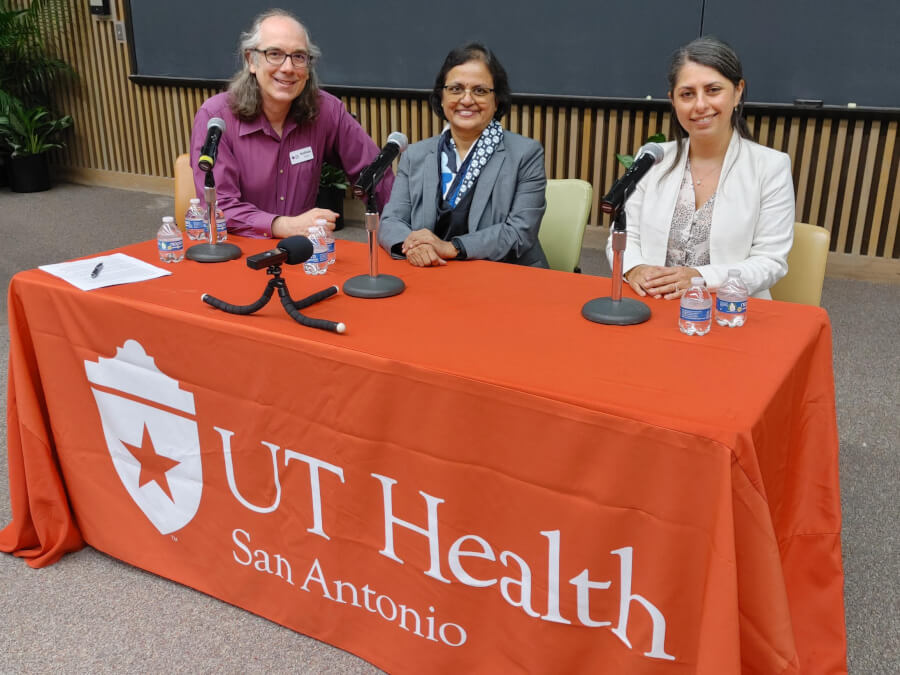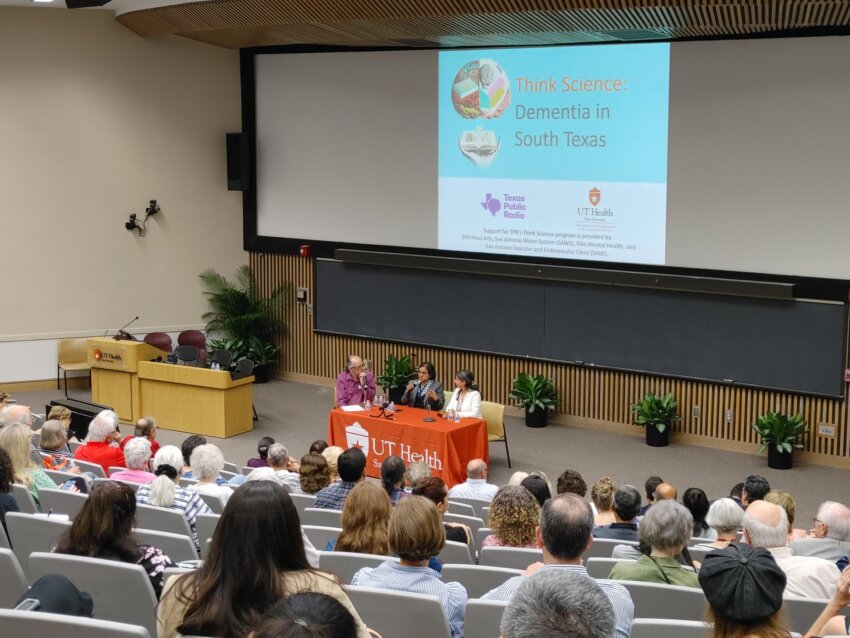Clinical trials, brain and biobank donation and risk factors among topics discussed
Contact: Will Sansom, 210-567-2579, sansom@uthscsa.edu
SAN ANTONIO (June 12, 2023) — “Think Science: Dementia in South Texas,” a live event moderated by Nathan Cone of Texas Public Radio, drew 300 people to the Joe R. and Teresa Lozano Long Campus June 7 for an intriguing and inspiring discussion of a topic important to so many in South Texas and the world.
Cone began by acknowledging Ann Biggs, whose husband, the late businessman and community leader Glenn Biggs, is the namesake of the Glenn Biggs Institute for Alzheimer’s and Neurodegenerative Diseases. Her son, Brian, and his wife, Melinda, accompanied her in the front row. “It is great to see you and a pleasure to have you here,” Cone said.
Demystifying dementia
“We know a lot about many diseases that wear on our bodies as we age,” he said in opening remarks. “We know a lot of ways to prevent, to treat, to fight back against things like heart disease and obesity and cancer. But with dementia, there are still so many unknowns out there. That’s what makes it scary for us. Tonight, we’ll be talking about the intersection of brain and body health and learning about the risk factors for stroke, why the Hispanic population has a higher risk for dementia, and what new treatments there are for dementia.”
Cone introduced the evening’s distinguished panelists, Sudha Seshadri, MD, professor of neurology and founding director of the Biggs Institute, and Claudia Satizabal, PhD, assistant professor of population health sciences who leads the institute’s population neuroscience core.

Preeminent speakers
As the founding director of the Biggs Institute, Seshadri oversees, integrates and coordinates all activities of the Biggs Institute. An internationally known leader in Alzheimer’s disease and dementia treatment and research, she leads global consortia studying these diseases and is the principal investigator on multiple grants from the National Institutes of Health.
Satizabal’s research focuses on lifestyle and genetic factors contributing to healthy brain aging versus factors leading to dementia. Currently, she is investigating markers to identify persons at risk of dementia before irreversible damage, the role of the gut microbiome in Alzheimer’s disease, and the continuation of a local study, the San Antonio Heart and Mind Study, to better understand brain aging in our community.
Seshadri and Satizabal offered overviews of their work, followed by a question-and-answer time with the highly engaged audience.
Clinical trials hold answers
Dementia is the only one of the top 10 causes of death that is increasing year to year, Seshadri said. “In the Biggs Institute, we are integrating clinical care with research as much as we can, so that everyone we are seeing for diagnosis or treatment can also be a part of research. We do this because the only way we are going to find better treatments for dementia is through clinical trials,” she said.
Secondly, South Texas is about 85% Hispanic. On average, Hispanics have a 50% higher risk of developing dementia. “Unfortunately, this is pretty high,” Seshadri said. “If we as a group don’t do anything, one in three of us will develop dementia at some time before we die. That is unacceptable, because memories shared over a lifetime should be savored when we grow old.”
Texas’ only federally recognized Alzheimer’s Disease Research Center
In addition to clinical trials, Biggs Institute researchers are working on projects involving mouse models, cell models and other basic research, and on improvement-of-life and educational projects for families, including experiences with music and art to relieve stress. The institute, one of America’s 33 National Institute on Aging-Designated Alzheimer’s Disease Research Centers and the only ADRC in Texas, is a multidisciplinary partnership with the community. The South Texas ADRC is a collaboration of the Biggs Institute with The University of Texas Rio Grande Valley.
“We’ve grown from having just one person in 2017 to more than 30 faculty members today,” Seshadri said. “Two years ago, we became recognized as one of the ADRCs of our nation, and we hope to live up to that and grow further over the next five years.”
Including Hispanics in clinical trials
Satizabal, a native of Colombia, was intrigued when Seshadri had the opportunity to open an Alzheimer’s disease- and dementia-related center in San Antonio.
“I really want to study the Hispanic community,” Satizabal said. “This is something we are working hard to accomplish, because the vast majority of studies to date include a narrow population of adults. Achieving diversity in our studies is the only way we are going to bring answers to everyone.”
Diet and exercise are important
Regarding the factors that contribute to dementia versus normal aging, she noted, “What we do throughout life will contribute to how our brain ages.” Modifiable facets such as healthy diet and appropriate exercise can overcome a person’s genetics, she said.
“The biology of the brain is very delicate,” she said. “We tell people, what is good for the heart is good for the brain, and vice versa. Hypertension, diabetes and smoking are damaging, and we need to be careful with those throughout life. Control what you can,” Satizabal said.
Start good habits sooner rather than later
In 95% of people, blood pressure becomes high sometimes, Seshadri said. “You should never have a blood pressure of 160 or 180, as that can lead to hemorrhage in the brain. Every bit of blood pressure can damage the brain.”
Having more fruits and vegetables and less salt, having a healthy body weight, exercising, sleeping seven to nine hours a night, and treating sleep apnea if present can help lower the blood pressure, she said.
Start better habits in midlife, in the 40s or 50s, rather than later when you are 70 or 80, she mentioned.
Dementia is not fate
Genetic differences in the Hispanic population are so far inconclusive, Satizabal said. “The problem in most genetic studies is the samples are in a very narrow segment of the population, mostly of European descent. What we do know is prevalence of dementia is more frequent in Hispanics.
“We are currently in our studies trying to increase the number of Hispanics and other diverse populations because, as Dr. Seshadri said, we need more understanding of how the disease impacts them.”
Dementia is not fate, Satizabal said. “For the general public, a better lifestyle frequently outweighs genetic risk,” she said.
Many genes involved
The Biggs Institute has a genetic counselor and does genetic testing, Seshadri said. The institute also has biobank in which more than 1,000 people have donated blood or spinal fluid.
Dementia is not caused by one gene. More than 80 genes have been implicated. A person may have 10 of those and another 15 of those. “Dementia is a complex genetic disease,” Seshadri said.
Family who was impacted: Sharon and Mike Tinnon
Audience member Mike Tinnon thanked the Biggs Institute and the UT Health Science Center School of Nursing for helping his family. His wife, Sharon, lost her battle with early onset Alzheimer’s disease in March. She was 69. The couple made the decision to donate her brain to the Biggs Institute brain bank.
“UT Health provided invaluable services for my wife and myself over the last several years. We benefited a lot from the medical team, therapists and psychologists at the Biggs Institute and also, very importantly, we registered for the brain bank. I should be getting a full report in a few months confirming her Alzheimer’s and maybe providing more information, and possibly helping with the science going toward a cure.
“And the final thing from UT Health,” he continued, “the Caring for the Caregiver program from the School of Nursing probably helped save my life. I cared for Sharon for nearly 10 years and oftentimes, the caregiver dies before the one with dementia. Most of the programs I took were during COVID, so it was on Zoom and all that.”
Sharon was a UT Health Science Center School of Nursing alumna
Sharon Tinnon was a San Antonio native who graduated from MacArthur High School in 1971. She had moved to Houston by 1981 when she met Mike Tinnon. Mike was a Michigan native who migrated to Texas for a job but, as he said, “found a wife.”
Sharon was a registered nurse who worked in operating rooms and later as a risk manager. One of her career highlights was working as a surgical nurse for the renowned heart disease surgeon Denton Cooley, MD. Later in her career, she received a Bachelor of Nursing degree from the UT Health Science Center at San Antonio School of Nursing in the late 1990s.
The Tinnons married in 1983 and would have celebrated their 40th wedding anniversary this year. They raised two sons who are now adults.
Report will bring closure
After a couple years of evidence of cognitive decline, Sharon Tinnon was diagnosed with Alzheimer’s disease in 2015. Receiving a report from the Biggs Institute brain bank is important for the family, her husband said. “Perhaps, besides Alzheimer’s, she had something else, like vascular disease. It will be a closure.”
She had an amazing career, he said, and “she was really smart.”
Seshadri thanked the Tinnons and everyone who has donated to the brain bank and biobank. “These are priceless gifts,” she said.
Be a part of the solution. Visit https://biggsinstitute.org/power-research/!
At the close of the evening, the Biggs Institute director spoke again about the importance of clinical trials. “Involvement in clinical research takes time and travel, but overall, people who are part of clinical trials do better than those who are not,” she said.
Clinical research studies evaluate new medications that are in the pipeline.
“UT Health Science Center San Antonio is building a new Center for Brain Health with 12 infusion bays,” Seshadri said. “We are hopeful that this is a new era in dementia care. We can beat dementia; let’s start doing something about it right away!”
The University of Texas Health Science Center at San Antonio (UT Health San Antonio), a primary driver for San Antonio’s $44.1 billion health care and biosciences sector, is the largest academic research institution in South Texas with an annual research portfolio of $360 million. Driving substantial economic impact with its six professional schools, a diverse workforce of 7,900, an annual operating budget of $1.23 billion and clinical practices that provide 2.6 million patient visits each year, UT Health San Antonio plans to add more than 1,500 higher-wage jobs over the next five years to serve San Antonio, Bexar County and South Texas. To learn about the many ways “We make lives better®,” visit UTHealthSA.org.
The Glenn Biggs Institute for Alzheimer’s and Neurodegenerative Diseases is dedicated to providing comprehensive dementia care while advancing treatment through clinical trials and research. The Biggs Institute is a National Institute on Aging (NIA)-designated Alzheimer’s Disease Research Center (ADRC). In addition to patient care and research, the Biggs Institute partners with the School of Nursing at UT Health San Antonio to offer the Caring for the Caregiver program.
Stay connected with The University of Texas Health Science Center at San Antonio on Facebook, Twitter, LinkedIn, Instagram and YouTube.


